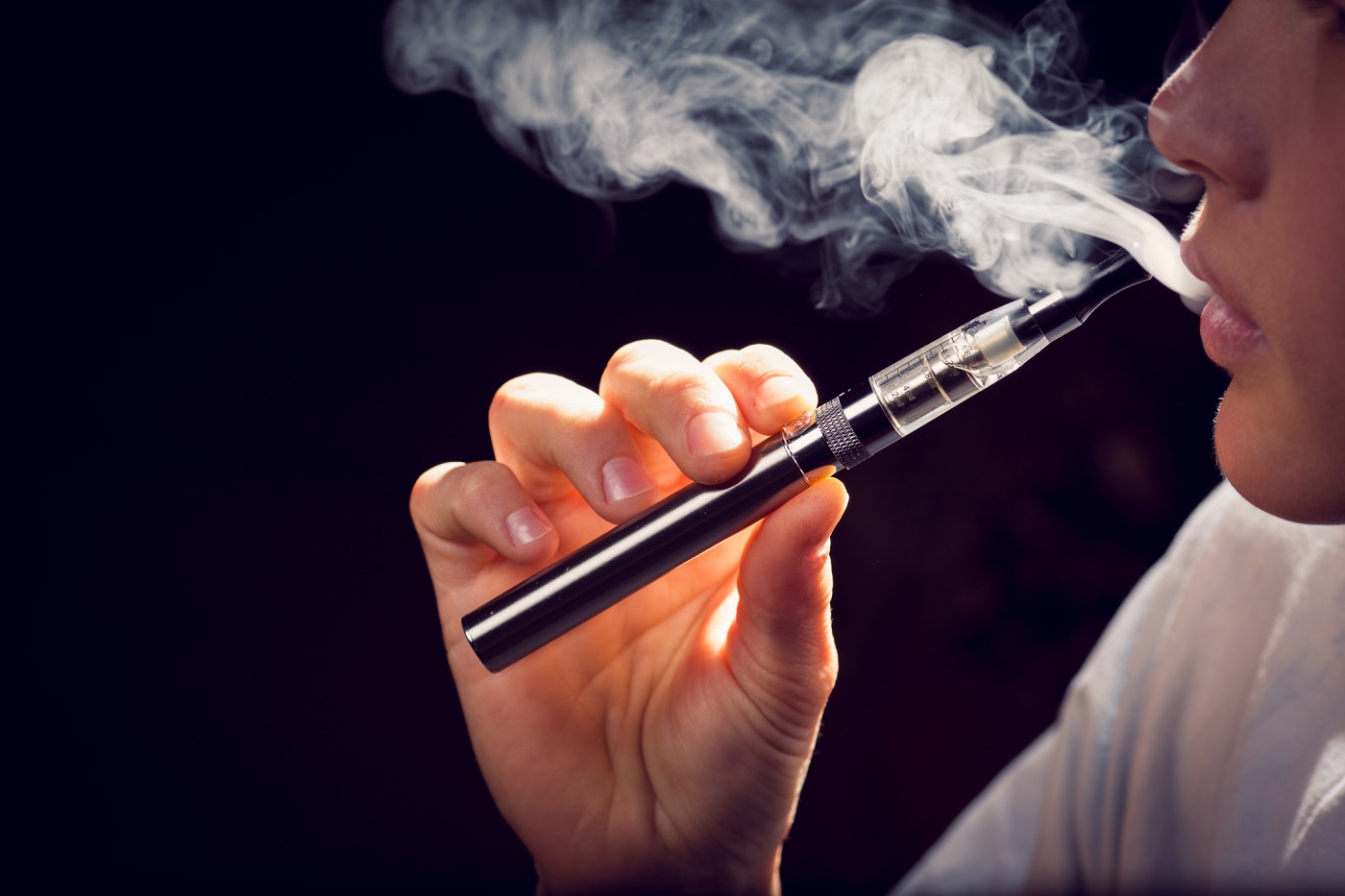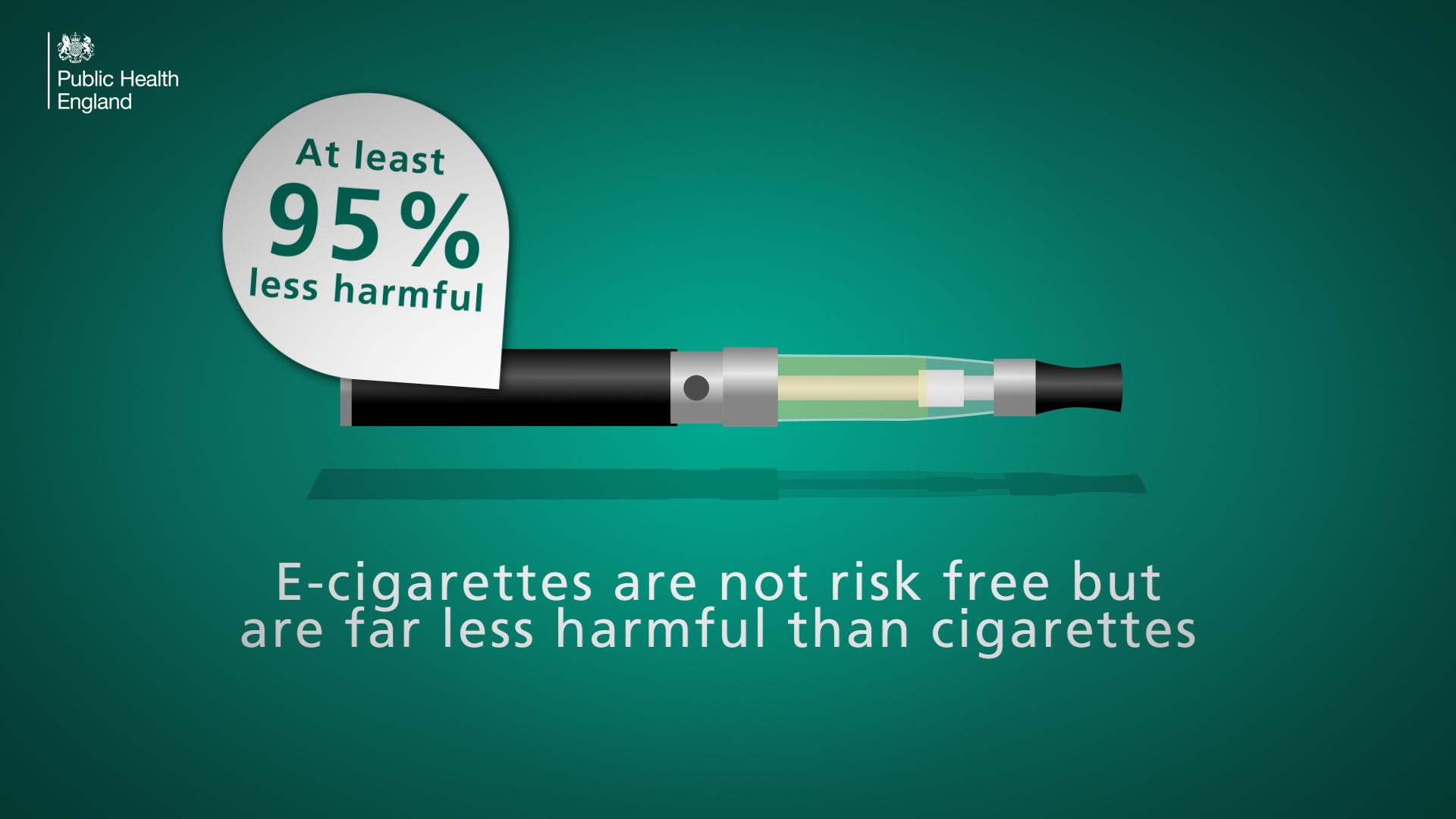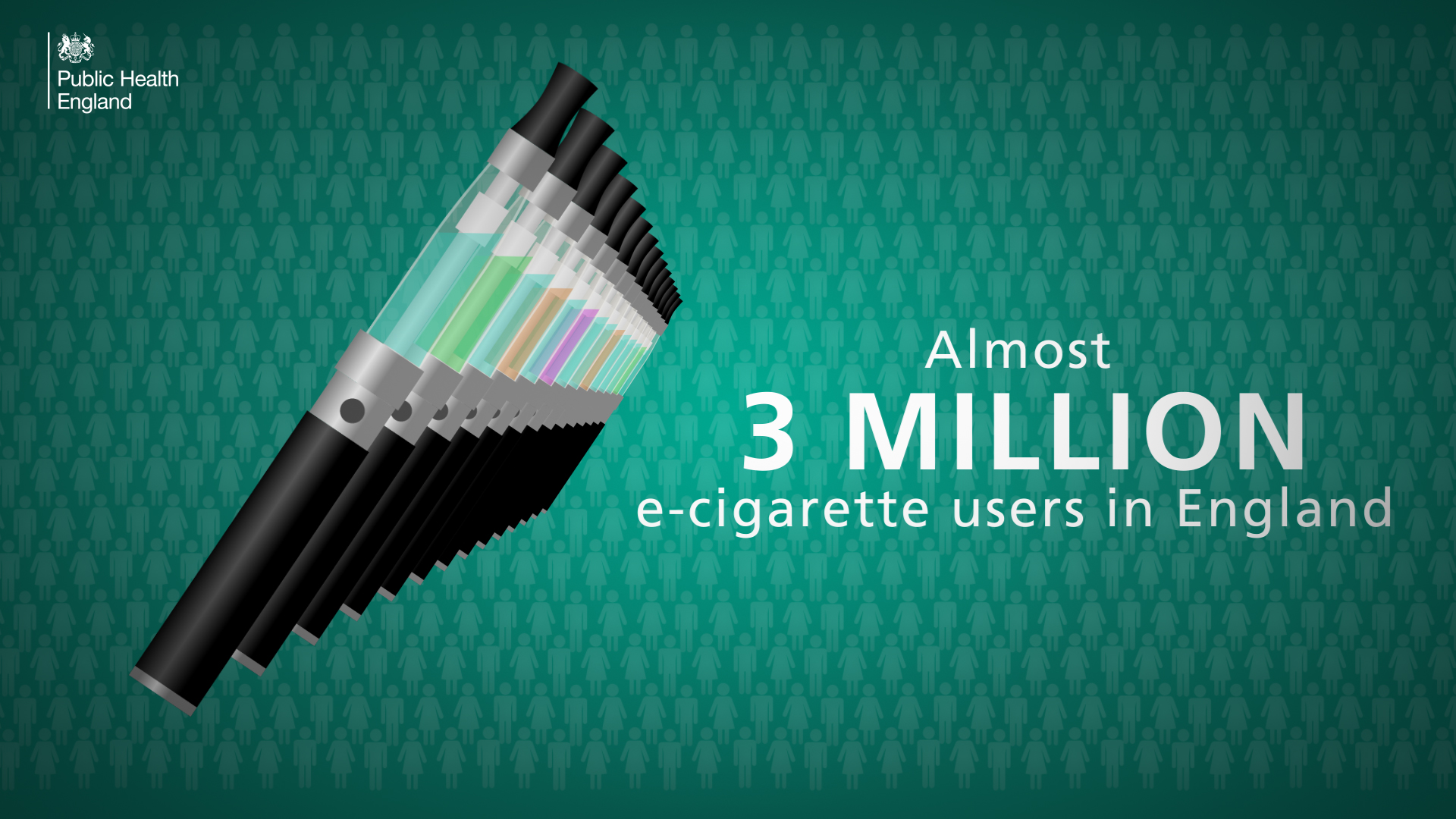
This post was published in 2018 when Public Health England had responsibility for health advice relating to e-cigarettes and may now be out of date. For the most recent information please visit the NHS website or search for the topic on the gov.uk website.
Back in 2015, the bold conclusions of our previous e-cigarette (EC) report were controversial in providing qualified support for the use of ECs but have since contributed to a shift in international opinion.
Many experts and professional bodies now agree that vaping is likely to be far less harmful than smoking.
Our latest report, which takes into account all new evidence since this point, covers regulation, EC use, ECs as a tool to help people quit smoking, and the safety of ECs, nicotine, and novel heat-not-burn tobacco products.
Below we look at some of the key questions and findings from the report.
How safe are ECs?
The risks of cancer, cardiovascular disease, and respiratory illness due to ECs are expected to be much lower than smoking. This is because the harmful chemicals present in cigarette smoke are either not in EC vapour or only found at much lower levels compared to smoke.
The most useful evidence comes from studies that compare smokers and vapers who don’t smoke and show declines in levels of markers of the harmful chemicals in the body.
We also know that, compared with tobacco smoke, EC devices produce low levels of toxic chemicals called aldehydes, except when on high power settings generating a vapour people wouldn’t inhale. Taking all this into account, although not risk-free, ECs are much less harmful than smoking – at least 95%, with the risk of cancer calculated to be less than 1%.

Our review strongly criticises reporting of studies in which the likely risks from ECs have been exaggerated. It also highlights that a quarter of smokers in England wrongly believe that ECs are as harmful as smoking.
It would be tragic if smokers who could quit with ECs do not try them because of these mistaken beliefs.
Are ECs effective quitting aids?
EC use is associated with improved quit success rates and a decline in smoking prevalence. ECs produce an estimated 18 000 additional long-term ex-smokers in England each year; a recent update suggests that figure might be as high as 57 000.
Data from local stop smoking services in England show that smokers using ECs combined with behavioural support are at least as successful in quitting as those using licensed medicines.
What are missing are randomised controlled trials (RCT) on ECs as a quitting aid. However, well-designed observational studies may be better as these would reflect what’s happening in the real-world – which EC people choose to use can affect their chances of quitting successfully.

Does EC experimentation increase smoking among young people?
Some studies show that young people who use ECs could be more likely to try smoking but certain young people may be predisposed to try both products. Experimentation with ECs among young people is fairly common but regular use (as least once per week) is still confined to those who have previously smoked.
What’s more encouraging is that the growing popularity of e-cigarettes seems to have had no negative impact on youth smoking rates which continue to decline.
Where should use of ECs be allowed?
In 2016, there were at least 25 countries where use of ECs was banned in enclosed public spaces. In countries, such as the UK, that have no ban, EC use is still restricted in many settings—e.g., on public transport and in schools.
It’s an important balance to strike; the risk of encouraging use of ECs, especially among young people, and any discomfort they may cause to others, with the need to support smokers using ECs to stop smoking and remain smokefree. For this reason, many hospitals in the UK now allow ECs in some areas, whereas smoking is banned.
Do ECs undermine existing anti-smoking measures?
Smoking prevalence continues to decline in the UK which suggests that the policies we have here are not renormalizing smoking. The majority of the time it’s easy to tell whether someone is using an e-cigarette opposed to smoking and ECs do not seem to be preventing enforcement of existing restrictions on smoking.
What evidence would we like to see in future?
Overall, the results of the review are reassuring and continue to support the idea that ECs are much less harmful than smoking. Data suggest that ECs are being used by tens of thousands of smokers to quit completely and by many more to reduce how much they smoke.
ECs are not causing more young people to smoke in the UK and most people who try ECs or use them to quit do not become addicted.
What we’d like to see evidence-wise over the coming years includes:
- Investigations into the way ECs are being used in the community, including trials of ECs as quitting aids
- Long-term studies looking at cardiovascular disease
- Further assessment of potential risks from less well studied chemicals in EC vapour such as the many flavourings and some metals
In terms of policy, all smokers should be supported to stop smoking completely, including those who smoke and use ECs. Support from smoking cessation clinics remains important in helping smokers to quit.
If we want to achieve a smokefree generation, we need to continue to make bold decisions on ECs backed by the evidence we have so we may continue to reduce the harms caused by tobacco.
Read our news story here.

13 comments
Comment by Mr P Davis posted on
As a Non-Smoker all my life. But also a without my consent passive smoker all my life, I am very disturbed and concerned in the promotion in having the approval os Public Health England is going to have on the uptake and proliferation of vaping.
Your Research and analysis -Evidence review of e-cigarettes and heated tobacco products 2018: executive summary - Published 6 February 2018 - 9.1 Key findings states that "To date, there have been no identified health risks of passive vaping to bystanders." Well although not in the company of vapours every day, I can tell you by experience and as a sciencetist, to please, please, investigate and research this further indepth before giving approval to polute my personal space. Something that I thought, with the ban on smoking in public areas such a public houses, I wouldn't have to suffer again.
Whilst I have done no scientific studies myself, I can inform you only of my personal experience and so, maybe raise questions:
1, I find the fumes of vapour very smelly and unpleasant, to walk through that seemingly is someone else's exhaling moisture from their lungs. We all exhale, but in carrying such, in a cloud of vapour would seem to prolong it's suspension in the air. Which one has to either walk through or try and avoid. Very difficult when walking down the narrow pavement down a street or when trying to eat lunch in a pub's beer garden, near to a table of vapours.' As you know, if one smells something, it is highly likely that particulates are suspended in the air. So does that mean nicotine, something I don't particularly wish to inhale, is it being exhaled. Is your chosen paramenters, considering the impact on sense of smell and mental health as in emotional feeling in living a pleasant life, as well as that, that can do physical harm? However that doesn't mean just covering the odour, as that would mean, the cause of the odour is still there.
2, When I have been in an enclosed space such as a car, with someone vaping. Even when they have stated they purchase the more expensive flavoured variety, that claims to only exhale water and air, has caused me unpleasantness. I have found my mouth drying execessively more than usually. This has been accompanied by a start of soreness irritation in the back of my mouth and throat. Upon informing the person vaping, they stopped. Upon stopping my dryness and irritation did not worsen. Although uncomfortable until I gained fluid to try and revive my mouth and throat. This took hours if not a day or two to be fully comfortable again. In unintentially breathing in vapours in other instances, has repeated this experience in varying of degrees.
I therefore would ask you to widen your research before implying that Public Health England approve vaping as a healthy option in life. Commiting non-smokers to a sentence, they have little choice or control over. Afteral, 'ask the right question, you'll gain the correct answer.' The nose and throat sensitivities as you know are extremely high and can vary person to person. Smokers can either damage or make their's resistant to such smells and irritations. Even in sensoring fumes and hazardous substances in relation to the Envirnmental Protection Act 1990, those monitoring say they rely on their own noses as well as scientific monitoring equipment. So life time non-smokers maybe more sensitive to the any substances and effects exhaled from vapours.
3, I would also ask you to consider what these irretants can be, what hangs in the exhaled vapours? What could cause the dry mouth and sore throat?
4, Whislt I don't think nothing to do with my symptoms, as not everone has a cold or flu, and none were apparent during my experience. I wonder if it is possible that colds and virus's etc can also be suspended in the vapour droplets? And if such is suspended for any significant periods compare to ordinary exhaling?
I welcome the encouragement to reduce people from smoking. But can't condone it at the cost of non-smokers right to not to be intruded upon by someone exhaling vapour. Also, if it is proven down the road, that my concerns are substantiated or that there is further evidence in concerns of health implications to those using vapours, what's the implication on our public health authority?
Comment by Blog Editor posted on
The authors of PHE’s report conclude that, based on the available evidence, “to date there have been no identified health risks of passive vaping to bystanders” (see pages 162-163 for the section on passive vaping). This is in contrast to the known serious harm to health from exposure to second hand smoke, which led to the introduction of the UK’s smokefree laws. In 2016 PHE published advice to guide organisations in developing policies on e-cigarette use that are informed by the evidence and support smokers to quit and stay smokefree, while managing any risks applying to a particular setting. The advice acknowledges that some people may be more sensitive than others to e-cigarette vapour: “people with asthma and other respiratory conditions can be sensitive to a range of environmental irritants, which could include e-cigarette vapour. The interests of such individuals should be taken into account when developing policies and adjustments made where necessary”. It also acknowledges the potential nuisance factor to bystanders and recommends that organisations consider this in relation to policies on vaping in indoor areas. PHE will publish annual updates of our evidence review on e-cigarettes until the end of this Parliament in 2022 and we continue to monitor closely the evidence on risks to both users and bystanders.
Comment by Riaz posted on
A study in Aug 2017 by Berkely Univ. California detected levels above safety of the chemicals (Formaldeid, Acrolein and Diacetil) exhaled by vapers. I'm not certain if those chemicals are causing your complaints but in excess they can cause cancer.
Comment by Bo Danielsen posted on
Strange that Public Health Workewrs can interprent data in such a way and end up recommenting and promoting EC. We know EC are harmful for the health and it keeps many people hooked up with dual smoking habits. It also seems to introduce children and young adults to smoking. There is only one thing to do - STOP it
Comment by Professor C Exley posted on
Did you take into account the fact that e cigarettes are a major contributor to human exposure to aluminium? (See; http://tobaccocontrol.bmj.com/content/early/2017/09/15/tobaccocontrol-2017-054002.responses)
Professor C Exley
Comment by Blog Editor posted on
The authors of PHE’s report looked at the up to date international peer-reviewed evidence on the constituents of e-cigarette liquid including metals. Their conclusion is that “the levels of metals identified in EC [e-cigarette] aerosol do not give rise to any significant safety concerns” (see pages 161-162). The study you have highlighted has not been subject to peer review and the article contains no information on the methodology used, so we aren’t able to comment on its reported findings.
Comment by Patricia Cade posted on
As a none smoker i would like to know the risks of passing someone puffing vapour into your face while walking past them which is most unpleasant & i should imagine unhygienic...
Comment by Geoff Vann posted on
It would,perhaps,be useful to provide a comparison of e-cigarette vapour with other familiar 'vapour exposures' such as the simulated smoke used in theatres and at concerts or,at a more personal level,aromatherapy oils.
Comment by Derek Twigg posted on
When I had my head and neck cancer operation in the Royal Surrey County Hospital in June 2014 I was very surprised to see a patient in the intensive care recovery room using an E cigarette. This at a time when Ecigarettes were not in common use. Even though nursing staff were moving about the ward I did not once hear a request to stop. Perhaps they thought this was the lesser evil!
Comment by non profit organisation in india posted on
All things considered, I am exceptionally inspired by your site and furthermore with your information. I got such a decent data from your article, it exceptionally helpful to us. Much thanks to you for giving us this information. You made an incredible site.
http://www.piramalswasthya.org/
Comment by Terry Brooker posted on
A very detailed and informative review, thank you for doing it on behalf of the British public. Like many elements of peoples health concerns there are pros and cons. From your review, it is clear that the use of ECs is much more preferable for both smokers and non smokers simply based on the thousands of other constituents of tobacco smoke compared to EC vapour, therefore more beneficial to the health of everyone. I am an EC user and have stopped smoking cigarettes completely. I am also very aware of passive smoking and treat my vapour in the same way as tobacco smoke where others are present. Given the amount of particulates in a normal town environment surely it is better to try to get ALL smokers to smoke ECs? Education and independent research (We all know what the tobacco industry did for years and what the food manufacturers are doing now in promoting unhealthy but very profitable processed food products. PHE in their attempt to provide a good review for the health of the British public can only be applauded, so thank you. Now, we must try to look at the food industry and the plastic spreads, meats contaminated with hormones, bacteria and antibiotics and pesticide contanmination in fruits and vegetables (particularly glyphosphates)? Sugar (in all its forms) which is added to all processed foods and the profit margins of the large corporates allowing them to market their distorted views to inform the willful ignorance of the general public. The perceptions in the review of smoking, ECs and nicotine are interesting to say the least and it is here that PHE need to educate the general public about many aspects of the current UK lifestyle. I'll leave the tax take on alcohol (much more toxic to the body than EC vapour and often involved in any violence) for another day. Good to see PHE spending tax payers money wisely 🙂
Comment by michael o neill posted on
e cigaretts were a great invention if you get the righ liquid its the same as a any cigarett i used the fluid american blend 18 mg 5 years ago and never smoked a cigarett again i was a 40 a day smooker of major one of the strongest ones on the market now im free
Comment by Aaron posted on
From my own experience vaping is much safer option than smoking. I am glad that vaping helped me with quitting. My health improved and it is good feeling to have such a energy again. It was longer journey but was worth it. Have the selection of different intensity and flavors is great.
Now i am almost nicotine free so i use Vapour2 just occasionally with my friends. But no i never used it in closed public places, i still feel like someone may get offended - even if it is allowed in some places.